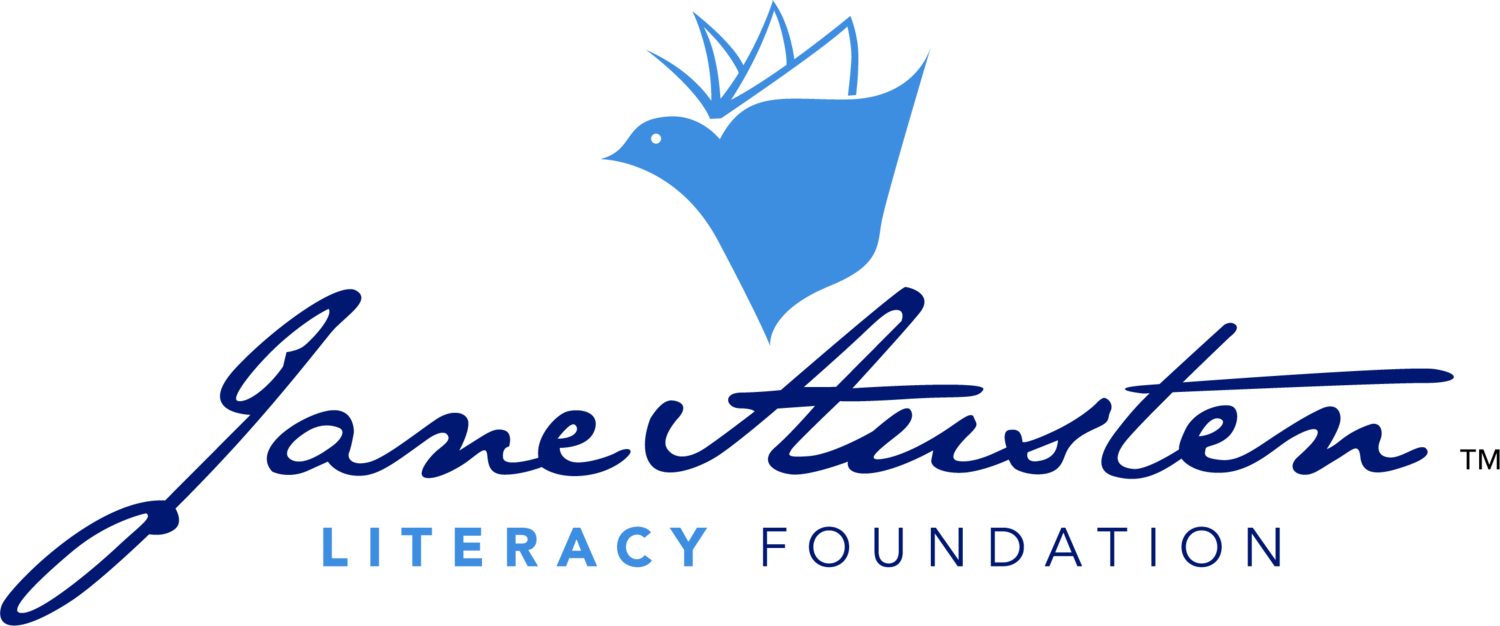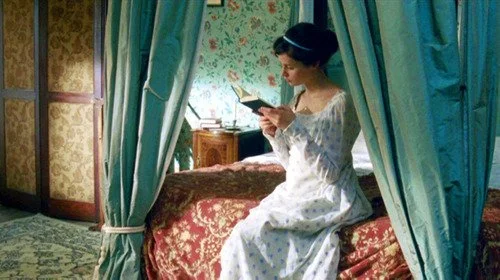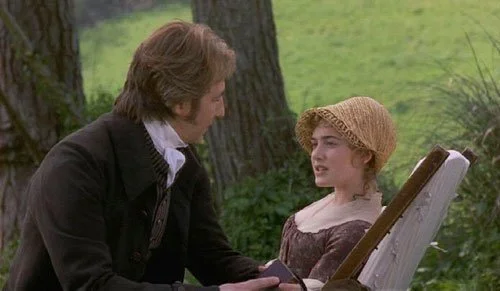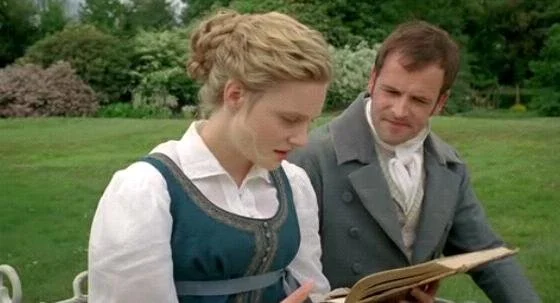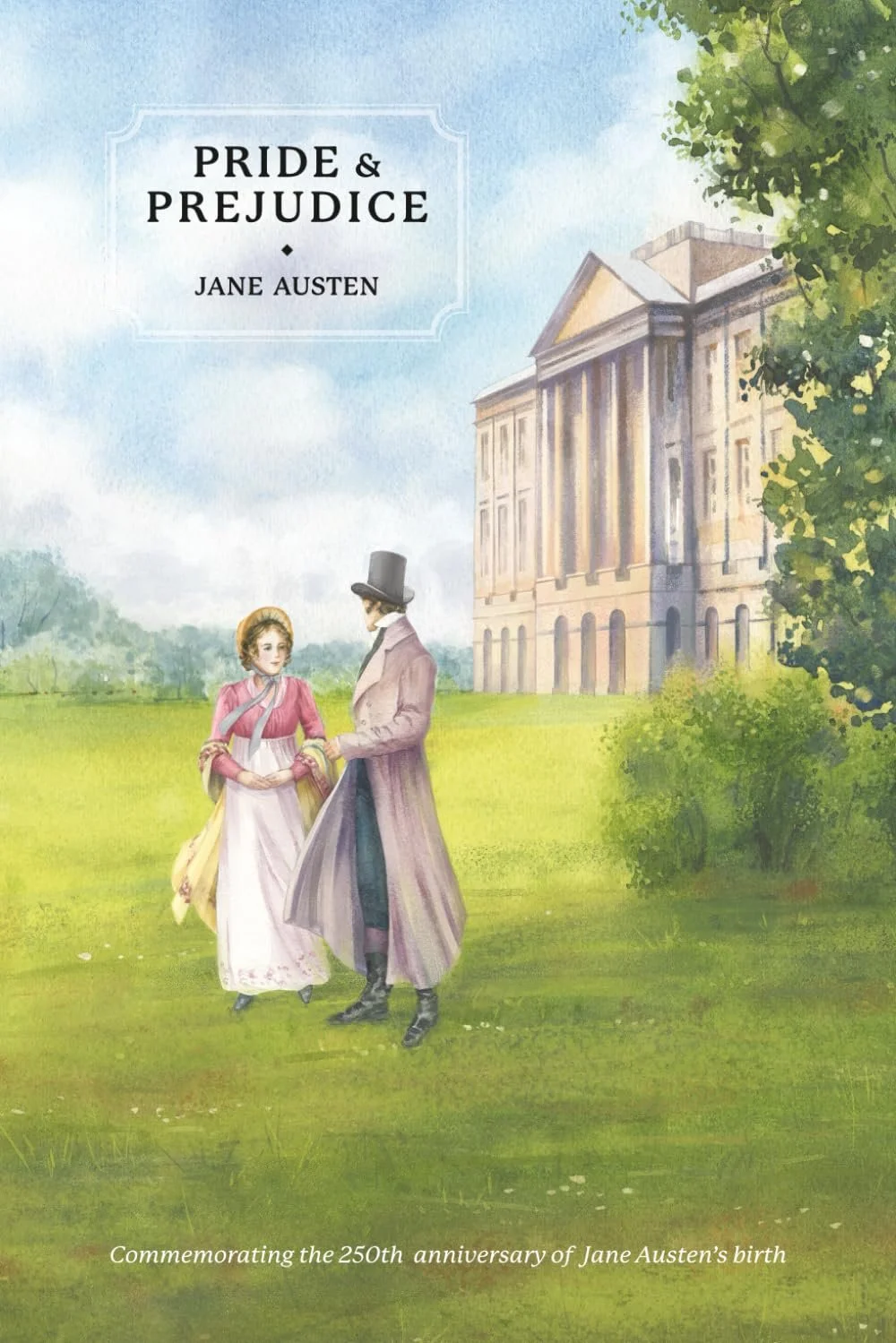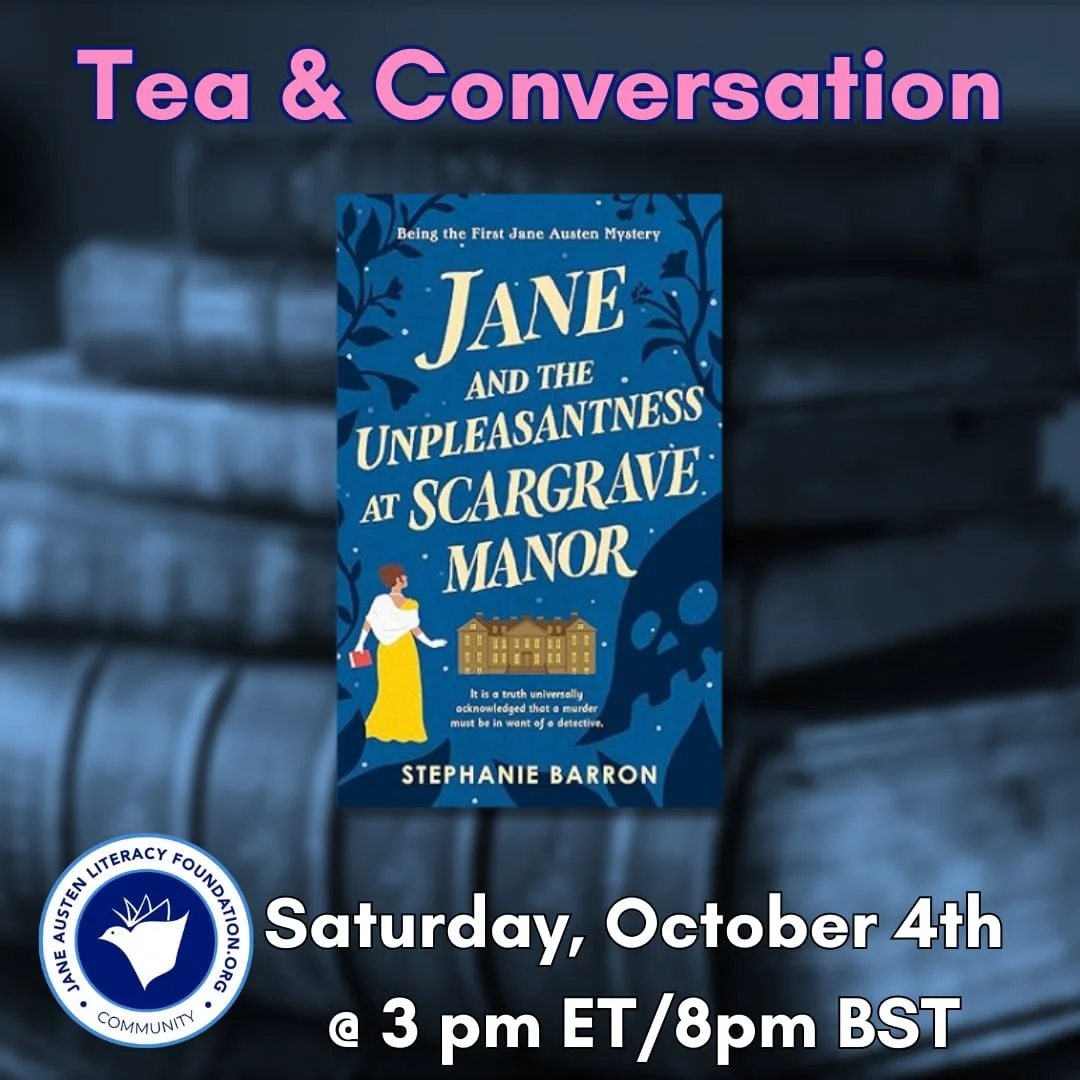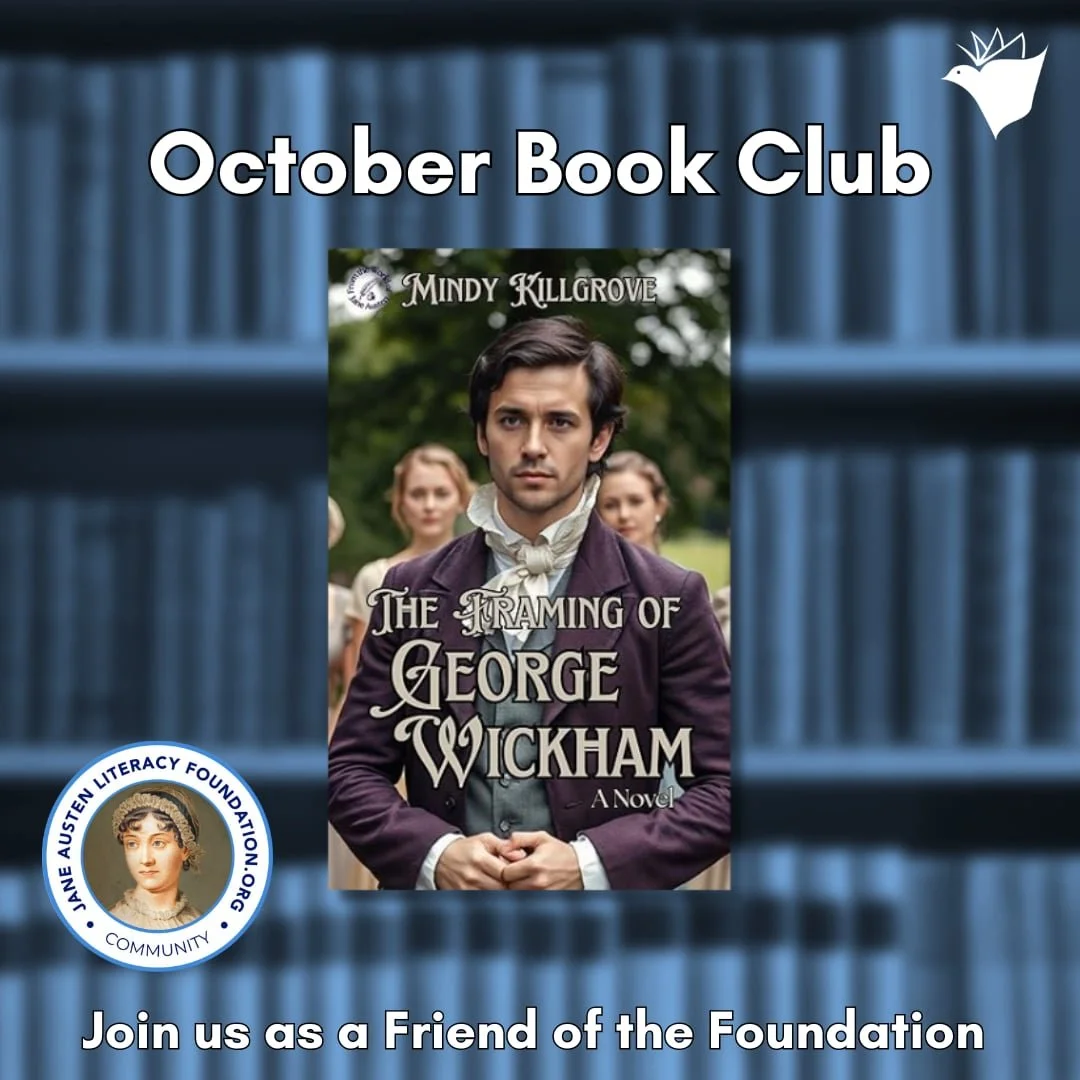““It is amazing to me,” said Bingley, “how young ladies can have patience to be so very accomplished, as they all are…They all paint tables, cover screens and net purses. I scarcely know anyone who cannot do all this, and I am sure I never heard a young lady spoken of for the first time, without being informed that she was very accomplished.””
Historical Fiction Author, and Editor of Pride & Possibilities, Mindy Killgrove, discusses ways in which modern people emulate Jane Austen and her heroines by creating their own curriculums and nurturing their educational needs.
Jane Austen, her close friends and correspondents, as well as her dear family members were constantly engaged in literary pursuits. They diligently wrote letters to one another, offered reading recommendations, and shared volumes of books. Jane’s relatives and friends encouraged her love of reading and writing. Regularly, Jane read aloud her latest work and delighted her listeners with tales she’d penned earlier in the day. She lived during a time when women were not necessarily provided the means or opportunities to pursue higher education. And so, it was imperative that Jane Austen and women like her satisfied their yearnings for knowledge by seeking out subjects that roused their intellects and sparked their creativity. Much like people living in the 21st century, Jane Austen and her fictional characters created curriculums that would not only give them myriad ways to fill the hours of the day but would also enhance their scope of understanding.
Just as Mr. Charles Bingley points out in Pride and Prejudice, an accomplished person may hold a variety of talents. They might be expert linguists. The person could possibly possess musical skills. Or—if the person has artistic inclinations, they could perhaps paint, draw, or sketch to an admirable degree. Those readers who know this scene in the book well will note that Mr. Bingley does not get the last word in this conversation. His musings are joined by his sister’s, Caroline’s, as well as Mr. Darcy’s. And the conversation does not end there because Elizabeth Bennet also has quite a bit to say about the interpretation of the accomplished woman. Even though his guests fail to acknowledge the significance of his contribution, Mr. Bingley’s point cannot be entirely ignored. An accomplished person should set goals for themselves, pursue them passionately, and be capable of sharing the fruits of their labor with others.
The idea of the self-guided curriculum is not necessarily a new concept, but it has gained traction recently as people of all ages are embracing the power that comes from devoting oneself to a particular subject matter that is, most importantly, self-selected. Austen’s characters lay the groundwork for creating one’s own curriculum and establish a pattern nearly anyone can easily follow.
While staying in Bath, Catherine Morland and her friend, Isabella Thorpe, diligently read and discuss works of gothic fiction. In the 2007 screen adaptation of Jane Austen’s Northanger Abbey, Felicity Jones as Catherine, is continually found with a book in her hand.
Select a Subject of Interest
Inspiration for a personal curriculum can come in many shapes and forms. Digital creator, Marie Campbell-Overby, says, “I can’t get enough of shark or ocean documentaries. I’ve been that way ever since I was young. I always watched (those shows) with my grandpa, that has now passed on. Watching them (now) brings back so many great memories.”
In Jane Austen’s Northanger Abbey, Isabella Thorpe and Catherine Morland discover, quite early in the book, that they nurture a shared interest in reading gothic literature.
“Dear creature! How much I am obliged to you; and when you have finished Udolpho, we will read the Italian together; and I have made out a list of ten or twelve more of the same kind for you.”
“Have you, indeed! How glad I am! What are they all?”
“I will read you their names directly; here they are, in my pocketbook. Castle of Wolfenbach, Clermont, Mysterious Warnings, Necromancer of the Black Forest, Midnight Bell, Orphan of the Rhine, and Horrid Mysteries. Those will last us some time.”
“Yes, pretty well; but are they all horrid, are you sure they are all horrid?”
“Yes, quite sure.”
Each, in her turn, extols the raptures of reading the works of Mrs. Radcliffe, as well as other famed authors, and then, quite naturally, they develop something like a modern-day book club. The ladies meet regularly to discuss their recent reading experiences and dissect the text. They laugh and exclaim over the outrageous storylines and encourage each other to continue reading novels in this genre. Catherine and Isabella easily determine which subject they wish to discover fully, then throw themselves wholeheartedly into the endeavor.
Collect Materials
During the Georgian Era and Regency Period, when Jane Austen penned, revised, and saw her novels published, people built their knowledge through the assistance of friends and neighbors. Having a personal collection of books was costly, so many people borrowed what they needed from lending libraries or their acquaintances. If a lady was interested in fashion, for instance, she might share a magazine with several others in the neighborhood, as well as within her family. When it came to learning about historically significant events, books were passed on from person to person and newspapers touched many hands before being set aside. Jenna Elliot, a sweet romance reader from Idaho, says, “Other than reading…I love messing with spreadsheets and numbers.” To nurture her interest, Elliot could devote time to working with spreadsheets on the computer, or leaf through paper copies. She might try her hand at manipulating different programs or plugging numbers into new equations. No matter the concept, by collecting a vast variety of materials, and sharing them with peers, a person can achieve a new and better understanding of any given topic.
Keeping to her self-created curriculum becomes an enjoyable endeavor once Marianne Dashwood is joined by Colonel Brandon. In the 1995 screen adaptation of Jane Austen’s Sense and Sensibility, Colonel Brandon reads aloud to Miss Marianne.
Build a Study Schedule
It so happens that in Jane Austen’s Sense and Sensibility the reader not only watches one of the characters develop her own curriculum but also is privy to the schedule she crafts to keep herself accountable.
Marianne Dashwood, after recovering from her illness says, “I have formed my plan and am determined to enter on a course of serious study. Our own library is too well known to me to be resorted to for anything beyond mere amusement. But there are many works well worth reading at the Park; and there are others of more modern production which I know I can borrow of Colonel Brandon. By reading only six hours a-day, I shall gain in the course of a twelve-month a great deal of instruction which I now feel myself to want.”
It is difficult to imagine having six hours per day to devote to a single course of study, but maybe, if the subject matter was truly intriguing, a person could find a way to do it. Rachel Boyd, an avid reader, says, “I’ve always been interested in forensics; my newest obsession in that realm is genetic or forensic genealogy.” One can imagine the sort of self-guided curriculum that could be developed around such a topic. There are books to be read, news articles that are destined for perusing, and movies and TV shows galore that would aid in the study of forensics. If a person was so inclined, they certainly could fill six hours a day with content related to their area of interest.
Stick to the Plan
After a person has defined what they wish to study and determined how best to tackle the subject, the only thing left to do is put the plan into action. Whether they are devoting six full hours, like Marianne Dashwood intends, or are simply moving through the material at a leisurely pace, like Catherine Morland, learners should be prepared for setbacks. Through Jane Austen’s character, Emma, we learn that sometimes, even the best laid plans go awry. “Emma has been meaning to read more ever since she was twelve years old. I have seen a great many lists of her drawing-up at various times of books that she meant to read regularly through—and very good lists they were—very well chosen, and very neatly arranged—But I have done with expecting any course of steady reading from Emma. She will never submit to anything requiring industry and patience, and a subjection of the fancy to the understanding.”
In Emma’s case, one might assume that the reason her studies failed is because she selected texts that were pre-approved by others, rather than topics that appealed to her. Perhaps if she had chosen differently and truly created a personal curriculum that included subjects which piqued her curiosity, she might have stayed on track and done a fair bit of reading. One area in which Emma sets a fine example is in her ability to find friends who not only care about her self-improvement but wish to encourage her growth. She is supported by Mr. Knightley and Harriet Smith, and, like Emma, modern learners need encouragement, too.
Emma tries to improve herself by creating a reading list and perusing the works. In the 2009 TV mini-series, Emma Woodhouse strives for understanding as Mr. Knightley sits nearby.
Let’s Study Together
So, what subjects will you pursue? Are you an art history enthusiast? Do you want to know more about the rainforest or the animals that live in it? Are you inspired by epic poetry or does the study of masonry strike your fancy? Regardless of the subjects that make their way onto your list of interests, consider sharing your studies with others. Together, just like Jane Austen and her characters, we can support one another and encourage personal growth through the study of fascinating subjects.
Mindy Killgrove
Mindy Killgrove is a cozy mystery, historical fiction, and romance novelist. She is the creator of the Riley Roundtree Social Story Learning Adventure Series for children. Killgrove has penned more than fifty full-length novels, forty short stories, and dozens of children’s books. She lives in Orlando, Florida with her supportive husband and three rambunctious but beautiful children. She is an enthusiastic Janeite who is overjoyed to serve as the editor of the Pride & Possibilities newsletter and share her love of reading and writing with everyone she encounters.
Pride & Prejudice: A Historic Commemorative Edition
To commemorate the 250th anniversary of Jane Austen’s birth, we are proud to launch the first publication of a Jane Austen novel since 1833 to feature and introduction by a family member.
This special edition includes:
- Introduction by Caroline Jane Knight, Jane Austen's fifth great niece
- Text from the celebrated 1894 Peacock Edition
- Personal reflections from Jane's family, Foundation ambassadors and supporters
- A beautiful wrap around cover and illustrations specially commissioned for this project
Experience Elizabeth Bennet and Mr. Darcy's timeless romance while discovering how Jane's work continues to inspire readers across the globe more than two centuries after publication.
All proceeds to the Jane Austen Literacy Foundation.
Our Community in October
Don’t forget to mark your calendars!
Our next Jane Austen Literacy Foundation Book Club meet-up is happening Saturday, October 4th, at 3 p.m. (EST) and 8 p.m. (BST). We’ll be diving into Jane and the Unpleasantness at Scargrave Manor by Stephanie Barron.
This quirky mystery features Jane Austen herself as an amateur sleuth. There’s a hint of romance, a sprinkle of intrigue, and even a bit of family drama. This twisty, cleverly-written tale is sure to spark a lively discussion and we can’t wait to hear your thoughts!
And you don’t want to miss our October Book Club pick as we skip into the cozy mystery The Framing of George Wickham by Mindy Killgrove!
He’s guilty—and they know it. When Lydia Wickham is suddenly struck down, all eyes turn to her husband, George Wickham. But is he truly guilty, or is there more to the story? It’s up to Kitty Bennet-Lovell and Mr. Andrew Selkirk to uncover the truth in this gripping mystery.
Join us for what’s sure to be a spirited discussion around one of Austen's most despised villains.
